 |
| Tripoli gunmen in action (Photo from Lebanon's daily an-Nahar) |
The Beirut daily al-Akhbar,
which is a leading mouthpiece for Syria in Lebanon, claims a tipoff from U.S. intelligence is
what brought about the arrest by Lebanon’s General Security Department of Syrian
opposition supporter Shadi al-Mawlawi in Tripoli.
The arrest -- linked to unrest in neighboring Syria -- sparked off three days of clashes between Lebanese Alawites
and Sunnites in Lebanon’s second largest city that has
recently become home to thousands of Syrian refugees fleeing the violence in
Syria.
The faceoff since Saturday between Tripoli's
two adjacent districts -- the predominantly Sunnite ‘Bab al-Tebbaneh’ and the
overwhelmingly Alawite ‘Jabal Mohsen’ -- has left eight people dead and about 80 injured.
The General Security Department arrested Mawlawi, a
Lebanese Sunnite Islamist opposed to the regime of Syrian President Bashar
al-Assad, after luring him to a government minister’s welfare association office
to supposedly receive healthcare assistance.
Lebanese security separately arrested other men, including
one Jordanian and one Qatari.
A military prosecutor has now charged Mawlawi “of
belonging to an armed terrorist organization.”
According to al-Akhbar,
“several (Lebanese) security officials say U.S. security agencies informed the
General Security Department that a Jordanian by the name of Abdelmalek Abdessalam
had crossed into Lebanon from Syria and is about to leave the country.
“The Americans said Abdessalam coordinates al-Qaeda
activities in several countries, among them Afghanistan, Iran, Pakistan, Syria,
Lebanon and Jordan. The General Security Department having alerted the border
crossings, Abdessalam was held at Beirut International Airport when trying to
board a flight to Amman.
“Abdessalam confirmed the suspicions against him during
interrogation… He admitted receiving funds from a Qatari citizen, Abdelaziz
al-Atiyah, who was also seized at his hotel (in a Beirut suburb), where he was
recovering from surgery. He has now been moved to a hospital in Mount Lebanon.
“Abdessalam gave interrogators the nom de guerre of his
Lebanese contact as ‘Adam’… A phone number tracked down ‘Adam,’ who turned out
to be Mawlawi.”
Lebanese army regulars and police forces are
today patrolling Tripoli and seem to have restored calm.
The army said in a statement its
units finished deploying in the violence-stricken areas of the city, including
Bab al-Tebbaneh, Jabal Mohsen and the Syria Street separating the two
neighborhoods bitterly
split over loyalties linked to the Syrian uprising.
The number of Lebanon’s Alawites is
undetermined, varying between a high of 120,000 and a low of 70,000. About 60
percent of them reside in Jabal Mohsen. Most of the rest live in the north Lebanese
governorate of Akkar.
No Alawite has ever been named
government minister in the Republic of Lebanon’s history. And it was only three
years after the 1989 Taef
Agreement that Alawites were able to fill their two allocated seats in the
128-member Lebanese
parliament.
Both Alawite legislators in the
current parliament – Khodr Habib and Badr Wannous – were elected on a
(anti-Assad) Future Movement ticket.
But the uncontested overlords of
Lebanon’s Alawites are Ali Eid and his son Rifaat, both diehard supporters of
Syria’s Assad dynasty. Rifaat was once quoted saying, “Our special links to
Syria, of which we are proud, are no different than the Shiites’ to Iran, the
Sunnites to Saudi Arabia, or the Maronites’ to France.”
Lebanese political analyst Rosanna
Boumounsef today notes in her daily column for Beirut’s independent daily an-Nahar the Syria crisis has left the
government of Prime Minister Najib Mikati in a quandary.
“Whereas the stands of the premier,
his ministers of interior and of finance and parliamentarian Walid Jumblatt were
critical of the security agency’s malapropos arrest that caused the turmoil in
Tripoli, government ministers and legislators belonging to the (pro-Assad)
‘March 8’ coalition defended it… The split can only add fuel to the fire.”
Progressive Socialist
Party leader Jumblatt says in remarks for
his PSP weekly al-Anbaa published
today:
“It is not the first
time tension and acts of violence grip Tripoli…
“You cannot dissociate
events there from the diligence of some security agencies – apparently motivated
by Syria – in deeming Salafism
an absolute evil. I wish one of these agencies’ bigwigs would come forward to
define to us Salafism.
“Why this dogged
insistence on magnifying the Salafist threat? How pervasive is it in Lebanon? Is
it restricted to Sunni Muslims? Why is it constantly linked to terrorism…?
“Aren’t we being led to
believe Lebanon has become a Salafist hub so we cutoff help and humanitarian
assistance to Syrian refugees in Lebanon and (acquiesce) to the arrest of activists
among them who would then be handed over to the authorities in Syria to face
execution?
“And why this
determination to ‘import’ al-Qaeda to Lebanon at all costs? Will al-Qaeda also
be used as a scarecrow to gag Lebanese support for the Syrian revolution and
the Syrian people who are facing the systematic and daily crimes being
committed by the regime in Syria?
“…Why the lack of full
coordination among all Lebanese security agencies? Is it because each has it own
political patron?
“…Does this explain why
telecom date was not released to a security branch trying to uncover the
persons behind the attempt on the life of Lebanese Forces chief Samir Geagea?
“…Better we calmed things
down and opted for reconciliation to clear the atmosphere in Tripoli… Better we
devised a wide-ranging economic development plan to tackle Tripoli’s misery and
resumed the national dialogue on a comprehensive national defense strategy
under state authority…”
